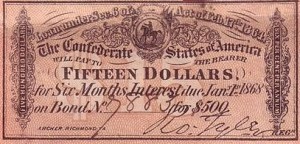 As the year draws to the a close, the Confederate economy is on unsteady ground. Prior to the war, the combined economies of the southern states that now comprise the Confederacy would have ranked the South as the fourth richest nation in the world. The South’s monetary landscape today, however, is in the early stages of a downward spiral. Cotton exports, representing almost all of the agrarian South’s national income, are down to almost nothing, thanks to the Union blockade. Meanwhile, the value of Confederate paper money is down about 10% for the year.
As the year draws to the a close, the Confederate economy is on unsteady ground. Prior to the war, the combined economies of the southern states that now comprise the Confederacy would have ranked the South as the fourth richest nation in the world. The South’s monetary landscape today, however, is in the early stages of a downward spiral. Cotton exports, representing almost all of the agrarian South’s national income, are down to almost nothing, thanks to the Union blockade. Meanwhile, the value of Confederate paper money is down about 10% for the year.
The resulting inflation is hurting employers and workers alike, including the printing industry of the South. In the midst of worker strikes in the publishing industry, the Tennessee Baptist newspaper is one of many that are trying to stay above water, as a notice in this week’s paper attests:
The type-setters of the city have leagued together to demand a very large increase of wages and have notified the publishers that on the 11th of January they shall demand 40@50 cents per thousand ems, instead of 33 1/3@49 as now; and also that only one apprentice will be allowed to an office of __ hand, and to no office more than two?
The publishers have had a meeting and decided that they cannot pay such exhorbitant [sic] wages. It would increase the expenses of some of our papers from $1000 to $1500 above what they now are—a sum larger than their present profits! Some papers would be compelled to stop. Publishers will be compelled to set the type for their own papers, publishing smaller sheets, unless printers can be obtained from other places who will work at reasonable wages. Newspapers are not like dry-goods, susceptible of an increase of price to meet an increased cost; they must be afforded at the same figures. Publishers cannot submit to extortion.
This office would like to engage three or four steady type-setters for the ensuing year, who will work at fair wages, paid every Saturday night. If we can secure two or three hands for a few weeks, we will amply remunerate them.
Signaling the beginning of the end for the paper during the Civil War years, the inflationary-driven strike pushes the Tennessee Baptist ever closer to insolvency. Within three months, the presses will fall silent.
Sources: “The Strike,” Tennessee Baptist, December 21, 1861 (link); “Economy of the Confederate States of America” (link)


